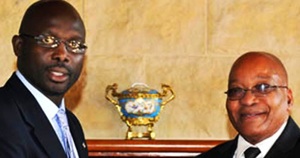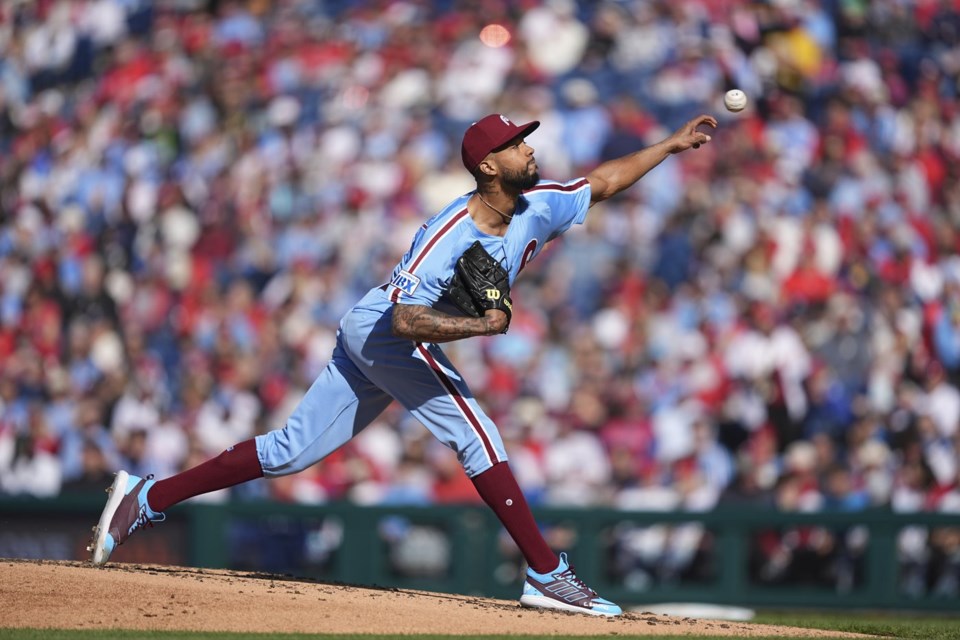Weah with South African President Jacob Zuma. Photo: Flickr
[Commentary: Africa]
In the second round of the Liberian election held on the 26th of December 2017, voters overwhelmingly voted for Senator George Weah as the 25th president of Liberia.
The road to the Liberian presidency took him 12 years in opposition. He defeated the sitting vice president Joseph Nyumah Boakai, a business graduate and former consultant to the World Bank. Mr. Boakai served as the VP of outgoing President Ellen Johnson Sirleaf for the past 12 years.
Weah has been a sports celebrity since his early days in Liberia with the Invisible Eleven (IE) and the national team, the Lone Star. He went on to a very colorful international soccer career first in Cameron and continued on to Europe where he played for some of the leading European clubs such as Monaco, Paris Saint Germain, AC Milan as well as Chelsea and Manchester City. He was named FIFA World Player of the year in 1995. He went on to win the Ballon d’Or, first African player to win such award. As his sports bio states: “In 1989, 1994 and 1995, he was named the African Footballer of the Year, and in 1996, he was named African Player of the Century. Known for his acceleration, speed, and dribbling ability, in addition to his goal scoring and finishing, Weah was described by FIFA as ‘the precursor of the multi-functional strikers of today.’ In 2004, he was named by Pelé in the FIFA 100 list of the world’s greatest living players.”
After such illustrious soccer career, the soccer champ might have asked himself, “having conquered the world of sport, what else do I want to conquer?’ In the country of his birth, Liberia, where he is considered national hero with mass following, he set his sight on the highest political office, the presidency. As an international celebrity, the only Liberian to have achieved such great success outside of politic, he believed that becoming president was not something beyond his ability to achieve. As such, he embarked on a political career. In the first post war election in 2005, he ran for president. In the first round, he topped all other candidates, including candidate Ellen Johnson Sirleaf, a long time political activist, but was defeated by her in the second round. Even though Madam Sirleaf won the second round, Weah and his supporters believed that he was cheated of the victory.
In second post war election of 2011, Weah ran as a vice presidential candidate with another experienced politician,Winston Tubman, a former Liberian diplomat and a relative of the longest serving Liberian president, the late William VS Tubman. The ticket was defeated by the incumbent Ellen Johnson Sirleaf.
Throughout the campaign of 2005, Weah’s biggest criticism came from those who thought he was not qualified for the top job because “he didn’t have the educational qualification and that being a national or international celebrity was not enough to elect him as president.” In the years following, he went to school and obtained both Bachelor and Master degrees.
In pursuit of higher education, he attended Devry University in Florida, USA and earned a Bachelor Degree in Business Management in 2011. Not resting with that he went back to school to earn a graduate degree in Management from the Keller Graduate School of Management, Devry University in 2013. According to Mr Weah at the time, “We all often strive to have college degrees. Some did, some never had the opportunity and some waited until the appropriate time was afforded. So in my case, it is something I have always striven for, but I never had the opportunity because of my football career.
And so, what I did, I did online courses. But after my career, I decided to go back to class because it is the right thing to do, and I am very glad, and I made my parents and even my critics proud.”
Having obtained these educational credentials, he came back to the country and ran for a senatorial seat in the national legislature in 2014. Many had advised that going for the senate maybe a preparation ground for the presidency in 2017. Running against several candidates in 2014, including the son of President Ellen Johnson Sirleaf, Robert Sirleaf. Weah won 75% of the votes to become a senator of Montserrado County, By also winning the senate seat, his supporters believed that he would use that position to make a stronger case for his quest for the presidency.
After 12 years of political sojourn, 2017 became the crowing moment of George Weah’s political career. With 19 candidates in the race, he came on top again as the first place winner. The ruling Unity Party candidate, Joseph Nyumah Boakai came second. The second round was scheduled for November 7th but due to the legal challenge to the results of the first round, it was finally held on December 26, 2017. The result of the second round showed Weah as the clear winner with 61%, a landslide victory.
As a result of many years of fratricidal warfare, Liberia is still considered by some as a “fragile country.” But with the third democratic elections in little over a decade, it is fair to say that Liberia has proven to be a stable nation with thriving democratic culture. With an opposition victory this time around, the first in the country with a promise of smooth transfer of power from one elected leader to another, something that’s not so common in most part of Africa, it is fair to say that Liberian democracy is maturing. The fact that we achieved opposition victory in Liberia can only bolster our democratic credential as a nation and people. We can now proudly say that we are a full fledged democratic nation. Such has come about through the tears and blood of the people in long years of civil wars.
Now that George Weah has finally gotten what had eluded him in the past 12 years, there are much anticipation of what he will accomplish as a president. Will he succeed in politic as he did in sports? His supporters believe he will succeed in a big way. His critics, some of whom said during the campaign that he was not “fit” for the presidency, think that not much will change under his leadership.
As he is set to take over the office of the president of Liberia on January 22, 2018, only the future will determine whether his supporters or critics are right. As the saying goes, only time will tell.
About the author: Nvasekie Konneh is a poet and writer. He’s authored two poetry collections and a memoir about the Liberian civil war. He’s a nine year veteran of the U.S. Navy. He divides his time between the U.S. and Liberia. He can be reached at nvaskon1@gmail.com







